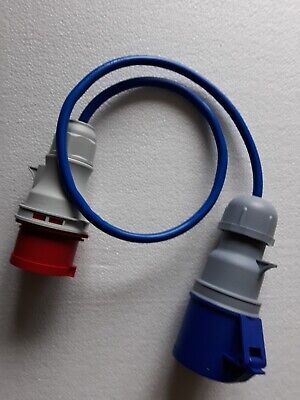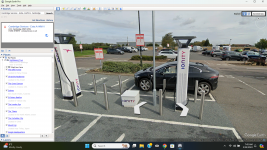You are using an out of date browser. It may not display this or other websites correctly.
You should upgrade or use an alternative browser.
You should upgrade or use an alternative browser.
Charging Leisure Batteries via EV points.
- Thread starter Trotter
- Start date
GeoffL
Full Member
- Messages
- 909
While this is not a product for me, something to point out is the length as that's crucial. AFAICT, most EV charging bays are marked "EV only", so you can't (morally, if nothing else) park in the actual bay. I've seen a YT video where the user parked in the nearest "standard" parking bay and was able to access a charge point because of the cable length. The content creator also made sure his light was on and the blind raised so that any EV driver who wanted to use the charge point wouldn't feel reluctant to knock on the door...Bruce's cable is not the same as an EV charging cable. The cable has components in it to communicate with the EV charger and set the correct parameters. The cable also has a lock on it that is used to stop the charging and release the cable from the charger. These features are normally handled by the computer in the EV. The cable is also 10M long. Bruce's cable is handmade and tested in the UK by Bruce.
Geek
Full Member
- Messages
- 959
Biyimg a generator to charge your batteries would be daft. The same miney spent on a B2B charger woyld be far more useful, used wvery time the engine is running.If you compare it to buying a generator to charge your battery’s it’s not so bad. Of course, you need to be somewhere with EV charge points but don’t think that’s a problem for most
Geek
Full Member
- Messages
- 959
I cant see why. Plug it into a hookup cable and the adapter cable length is immaterial.While this is not a product for me, something to point out is the length as that's crucial.
AndyWill64
Full Member
- Messages
- 171
I cant see why. Plug it into a hookup cable and the adapter cable length is immaterial.
Message #3 in this thread and the blurb about the cable itself makes it clear that extending the cable is NOT permitted.
Admin
Administrator
- Messages
- 2,430
These are tethered fast chargers that you could not use anyway.there is always a queue at Cambridge services & no room for a m/h space to small in most place's
Admin
Administrator
- Messages
- 2,430
There are regulations for the type of cable and hookup cable does not conform to these.I cant see why. Plug it into a hookup cable and the adapter cable length is immaterial.
nabsim
Full Member
- Messages
- 4,183
Maybe the way you use your van that works but I would have to drive 3 hours every day to keep my battery’s topped up. That would be crazy compared to running a generatorBiyimg a generator to charge your batteries would be daft. The same miney spent on a B2B charger woyld be far more useful, used wvery time the engine is running.
Admin
Administrator
- Messages
- 2,430
I am not aiming this response at Geek’s post but there does seem to be a lot of people telling other people why their way is wrong. This happens a lot on Facebook.Maybe the way you use your van that works but I would have to drive 3 hours every day to keep my battery’s topped up. That would be crazy compared to running a generator
We all have different needs, wants and joy. If someone asks for my advice or opinion then I give it, but I never assume that the way I like to do things is the right or best way for others.
Iandsm
Full Member
- Messages
- 271
Good question but I wonder if any providers state that their charging points May NOT be used for charging motorhomes, I mean if your motorhome was an electric one as some commercial vans are now surely you would be allowed to use the charger, so if you are barging the propulsion battery I see little difference n charging the leisure battery, they are both batteries attached to the vehicle.Can you tell me which ev charger providers state they can be used for anything except charging an electric vehicle please, the providers I have checked say ev only?
mistericeman
Full Member
- Messages
- 796
Possibly the issue with motorhomes charging from eV charge points is working/suitable charge points can be in short supply in some places ...Good question but I wonder if any providers state that their charging points May NOT be used for charging motorhomes, I mean if your motorhome was an electric one as some commercial vans are now surely you would be allowed to use the charger, so if you are barging the propulsion battery I see little difference n charging the leisure battery, they are both batteries attached to the vehicle.
So a EV owner looking to charge is probably not going to be delighted at turning up and finding a motorhome plugged in ...
Probably not helping folks general perception of motorhomes in general ...
Personally I can't see a situation arising where I'd need to plug into an EV point ...
Solar/b2b/battery bank along with the odd site stop for waste/water/electric .
Maybe more suited to the Toilet casette in a shopping bag/park anywhere as long as its free folks ?
Admin
Administrator
- Messages
- 2,430
There are no companies that prohibit motorhomes charging at EV points, but they do not state that they allow it either.Good question but I wonder if any providers state that their charging points May NOT be used for charging motorhomes, I mean if your motorhome was an electric one as some commercial vans are now surely you would be allowed to use the charger, so if you are barging the propulsion battery I see little difference n charging the leisure battery, they are both batteries attached to the vehicle.
Admin
Administrator
- Messages
- 2,430
As I stated in a previous post the 7Kw chargers that Motorhomes would use are not the ones that EV owners prefer as they are very slow.Possibly the issue with motorhomes charging from eV charge points is working/suitable charge points can be in short supply in some places ...
So a EV owner looking to charge is probably not going to be delighted at turning up and finding a motorhome plugged in ...
Probably not helping folks general perception of motorhomes in general ...
Personally I can't see a situation arising where I'd need to plug into an EV point ...
Solar/b2b/battery bank along with the odd site stop for waste/water/electric .
Maybe more suited to the Toilet casette in a shopping bag/park anywhere as long as its free folks ?
It costs money to buy the cable and you have to pay for the electric you use. “Toilet casette in a shopping bag/park anywhere as long as its free folks ?” suggests that using an EV point is bad (free loader?) behaviour, I disagree.
mistericeman
Full Member
- Messages
- 796
I still think it doesn't look good ....As I stated in a previous post the 7Kw chargers that Motorhomes would use are not the ones that EV owners prefer as they are very slow.
It costs money to buy the cable and you have to pay for the electric you use. “Toilet casette in a shopping bag/park anywhere as long as its free folks ?” suggests that using an EV point is bad (free loader?) behaviour, I disagree.
Not that that will matter to a lot of folks .
AndyWill64
Full Member
- Messages
- 171
I still think it doesn't look good ....
Not that that will matter to a lot of folks .
So maybe it's for us to show that we can do things in a socially acceptable way, and that we're not all the dirty pigs that give people cause to complain?
I see nothing wrong with parking next to an EV point and offering to disconnect if an EV owner wants to use it. I wouldn't connect up and walk away.
mistericeman
Full Member
- Messages
- 796
I admire your optimismSo maybe it's for us to show that we can do things in a socially acceptable way, and that we're not all the dirty pigs that give people cause to complain?
I see nothing wrong with parking next to an EV point and offering to disconnect if an EV owner wants to use it. I wouldn't connect up and walk away.
Good luck ,
Personally I can't see a situation where I would need to do it ...
witzend
Full Member
- Messages
- 1,012
just use one of the 3 phase wiresBut that link says it's a 3 phase cable, so I'd like to see how that would be wired to a standard 16a connector.

16amp 3-phase 5-pin plug to 32amp 240v socket.mains convertor | eBay
16amp 3-phase 5-pin plug to 32amp single phase(240v) socket.mains convertor.good for 16amps max..c/w 1mtre cable
www.ebay.co.uk
Last edited:
Geek
Full Member
- Messages
- 959
Yes, it says that. The wiring inside the van is to the same standard as a hookup cable.Message #3 in this thread and the blurb about the cable itself makes it clear that extending the cable is NOT permitted.
nabsim
Full Member
- Messages
- 4,183
When I very first heard about this I thought it must be against terms of the chargers. Didn’t take much looking to find out it isn’t against any terms on the chargers or their web sites, (or certainly wasn’t when I looked). The charger providers are just selling electricity, I am sure they are happy to sell to non EV users when they would otherwise not be in use.
As I do things now they aren’t much use to me, certainly not enough to add another cable to what I already carry. I only really go into towns to shop and when the shops are open the points could be in use. I haven’t come across any chargers on byways and such so far but who knows in the future.
I don’t see a problem with people using them if they are sensible. It’s if people start disputes with EV owners if they are waiting to charge their cars I can see problems arising. People I have seen using the cables always say they would unplug so should be good
As I do things now they aren’t much use to me, certainly not enough to add another cable to what I already carry. I only really go into towns to shop and when the shops are open the points could be in use. I haven’t come across any chargers on byways and such so far but who knows in the future.
I don’t see a problem with people using them if they are sensible. It’s if people start disputes with EV owners if they are waiting to charge their cars I can see problems arising. People I have seen using the cables always say they would unplug so should be good

